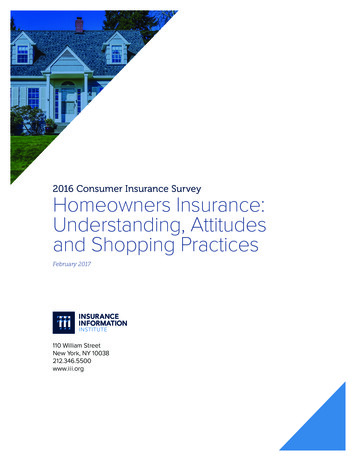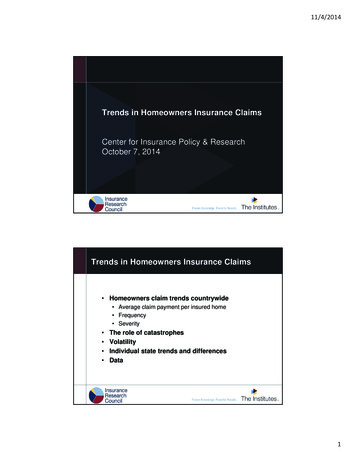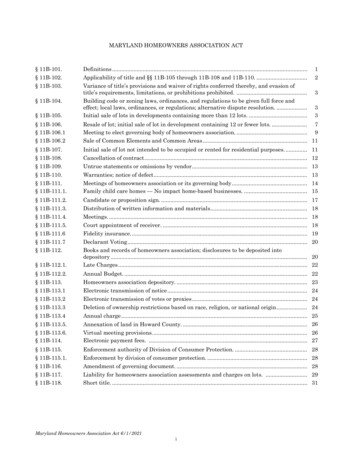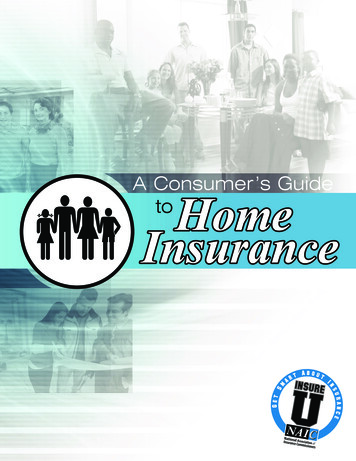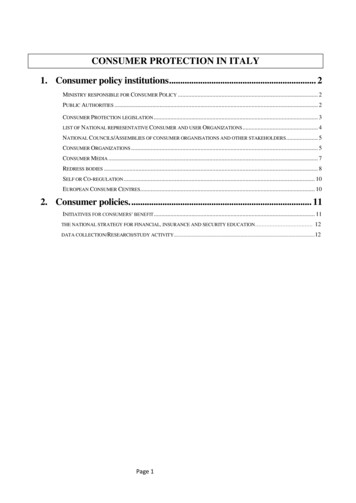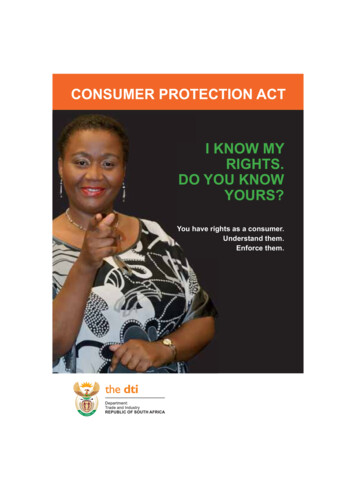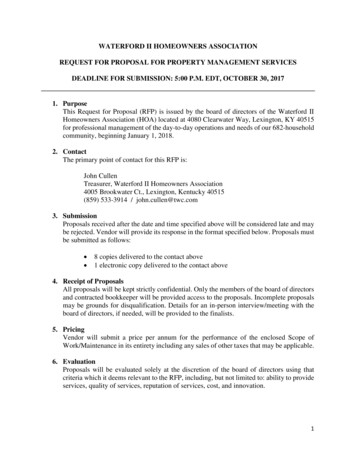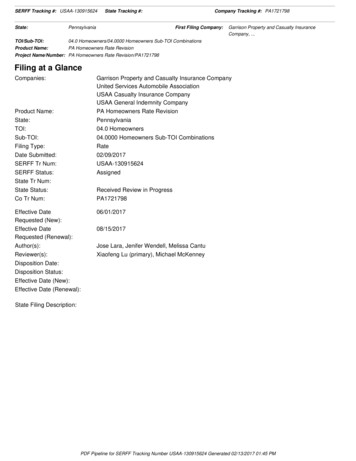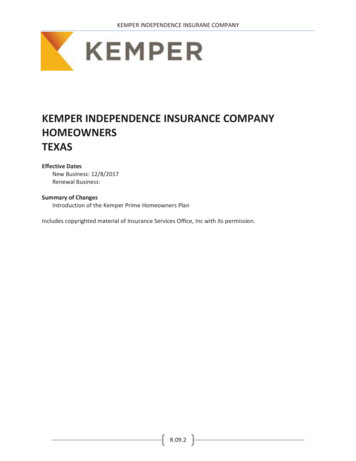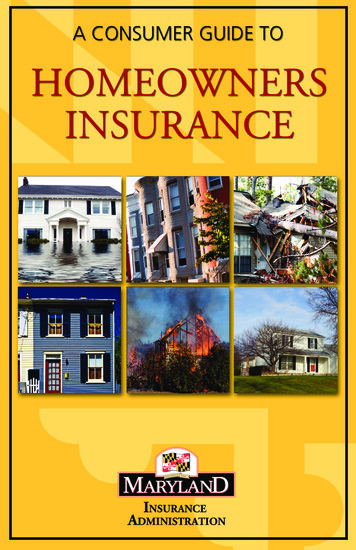
Transcription
A Consumer Guide toHOMEOWNERSINSURANCEINSURANCEADMINISTRATION
A Co n s u m e r G u i d e to h o m e ow n e r s I n s u r a n c eTa b l e o f C o n t e n t sIntroduction . . . . . . . . . . . . . . . . . . . . . . . . . . . . . . . . . . . . . . . . . . . . . . . . . . . . . 1Why You Need Homeowners Insurance . . . . . . . . . . . . . . . . . . . . . . . . . . . . . . . . 1Types of Homeowners Policies . . . . . . . . . . . . . . . . . . . . . . . . . . . . . . . . . . . . . . . 2Basic Coverages Included in Homeowners Policies . . . . . . . . . . . . . . . . . . . . . . . 10Factors in the Cost of Homeowners Insurance . . . . . . . . . . . . . . . . . . . . . . . . . . 15Lenders Can “Force-Place” Property Insurance . . . . . . . . . . . . . . . . . . . . . . . . . . 17Options if You Have Problems Obtaining a Policy . . . . . . . . . . . . . . . . . . . . . . . 17Tips for Buying a Policy . . . . . . . . . . . . . . . . . . . . . . . . . . . . . . . . . . . . . . . . . . . 18Actions to Protect Your Property . . . . . . . . . . . . . . . . . . . . . . . . . . . . . . . . . . . . 24Obligations After a Loss . . . . . . . . . . . . . . . . . . . . . . . . . . . . . . . . . . . . . . . . . . . 26Frequently Asked Questions . . . . . . . . . . . . . . . . . . . . . . . . . . . . . . . . . . . . . . . . Claims . . . . . . . . . . . . . . . . . . . . . . . . . . . . . . . . . . . . . . . . . . . . . . . . . . . Cancellations and Renewals . . . . . . . . . . . . . . . . . . . . . . . . . . . . . . . . . . . Coverage . . . . . . . . . . . . . . . . . . . . . . . . . . . . . . . . . . . . . . . . . . . . . . . . .28283135Solving Problems With Your Insurance Company . . . . . . . . . . . . . . . . . . . . . . . 37Glossary . . . . . . . . . . . . . . . . . . . . . . . . . . . . . . . . . . . . . . . . . . . . . . . . . . . . . . . 40Maryland Insurance Administration 800-492-6116 www.mdinsurance.state.md.us
A Co n s u m e r G u i d e to h o m e ow n e r s I n s u r a n c eIntroductionThe Maryland Insurance Administration (MIA) is an independent State agency thatregulates Maryland’s insurance marketplace and protects consumers by ensuringthat insurers and insurance producers (agents and brokers) act in accordance withinsurance laws. We produced this guide to help educate Maryland residents abouthomeowners insurance.The Insurance Administration is also responsible for investigating and resolvingcomplaints and questions concerning insurers that do business in Maryland.W h y Yo u N e e dHomeownersInsuranceMost people do not think about homeowners insurance until they have reason touse it. Although we know that fires, thefts and accidents occur, we tend to think,“Odds are, that will never happen to me.”Well, odds are more likely that, at some point, you will experience a fire, theft,accident or other loss that may be covered by homeowners insurance. Purchasinghomeowners insurance will not prevent fires, thefts or some other types of loss, butit can help you recover from the financial effects of a loss that is covered by yourpolicy.A homeowners policy also can protect you if someone is hurt or has their propertydamaged because of something you do or if something that you own hurts someoneelse or damages their property.Maryland Insurance Administration 800-492-6116 www.mdinsurance.state.md.us1
A Co n s u m e r G u i d e to h o m e ow n e r s I n s u r a n c eYou also will need insurance to protect your lender if you have borrowed moneyto purchase your home. Most mortgage holders require you to have homeownersinsurance and that the policy name the mortgage holder as an additional insuredunder the policy in order to protect their financial interest in your home. However,even if you do not have a mortgage on your home, you may still want to purchase ahomeowners insurance policy to protect you from financial harm in the event of acovered loss.Whether you live on a farm, or own or rent an apartment, condominium, home ormobile home, your home is probably your largest and most important investment,and a homeowners policy will help you protect your investment. There aredifferent types of homeowners policies available to fit your housing situation.Types ofHomeownersPoliciesHomeowners insurance policies vary according to the types of property they aredesigned to cover and the number of perils (causes of loss) that they cover. Policiesmay be of the named peril type (fire, windstorm, hail, vandalism, theft, etc.) orof the open perils type (coverage for all causes of loss unless the cause of loss isspecifically excluded), or a combination of both. While a number of insurers (orinsurance companies) offer the same type of coverages, many sell a policy thatprovides extra or broader coverages.Policies have various names depending on the insurer that sells them. However,standard homeowners insurance policies are often referred to as:2 HO-2 Broad Form (Named Peril) HO-3 Special FormMaryland Insurance Administration 800-492-6116 www.mdinsurance.state.md.us
A Co n s u m e r G u i d e to h o m e ow n e r s I n s u r a n c e HO-4 Renters Insurance (Contents Broad Form) HO-6 Condominium Unit Owners Market Value or Older Homes Forms (Modified Coverage Form)The type of policy you choose should depend on: Your type of housing; How much you are willing or able to pay; How much coverage you believe is necessary for your situation.The property damage section of named-peril policies contains a promise to payfor losses to your home and/or its contents when caused by the perils specificallynamed in the policy. If your property is damaged due to a peril not listed inthe policy, your insurer will not pay for the damage. The named-peril policycovers most, but not all, of the common causes of damage to a person’s home orbelongings. If you are considering purchasing this type of policy, be sure that youunderstand the type of coverage it provides.An open-perils policy, or all-risk policy, provides coverage for all causes of lossunless the specific cause of loss is excluded from coverage under the policy. Theopen-perils policy typically provides more protection than a named-peril policy,as it tends to cover more causes of loss. Often, the extra premium for this type ofpolicy is relatively small. When shopping for insurance, ask for a price quotationon both an all-risk policy and a named-peril policy. If the difference in priceis affordable, you may want to buy the open-perils or all-risk policy for moreinsurance coverage.Most insurers also sell a homeowners policy that combines the features of theall-risk policy and the named-peril policy. This policy is called the Special FormMaryland Insurance Administration 800-492-6116 www.mdinsurance.state.md.us3
A Co n s u m e r G u i d e to h o m e ow n e r s I n s u r a n c e(HO-3). The property damage section of this policy provides all-risk coverage onthe building and other structures by promising to pay for all losses to your propertyexcept when the loss was caused by a peril that is specifically excluded by the policy.It provides named-peril coverage for the contents of your home. The named perilsare usually those listed in the Broad Form (HO-2). (See list below.)A Quick Summary of Coverageunder Each Type of PolicyA. The HO-2 (Broad Form) is a named-peril policy, which generally covers thefollowing perils:1. Fire and lightning2. Removal of property endangered by any insured peril3. Windstorm4. Hail5. Explosion6. Riot and civil commotion7. Vehicle or aircraft damage to your property8. Smoke9. Vandalism and malicious mischief10. Breakage of glass4Maryland Insurance Administration 800-492-6116 www.mdinsurance.state.md.us
A Co n s u m e r G u i d e to h o m e ow n e r s I n s u r a n c e11. Theft12. Falling objects13. Weight of ice, snow, or sleet damage14. Collapse of building and any part thereof15. Sudden and accidental damage, cracking, burning or bulging from steamor hot water heating system or appliances for heating water16. Accidental discharge or overflow of water or steam from plumbing orheating systems17. Freezing of plumbing, heating or air conditioning systems and domesticappliances18. Sudden and accidental injury from artificially generated electrical currents19. Limited coverage for trees, shrubs or plants20. Additional living expenses21. Personal liability insurance protection22. Medical payments coverageB. The HO-3 (Special Form) generally provides the following coverage:1. Usually covers a building against all perils, but often excludes flood,earthquake, neglect, war, nuclear accident, damage resulting from freezingof an unoccupied building, enforcement of an ordinance, damage to fences,Maryland Insurance Administration 800-492-6116 www.mdinsurance.state.md.us5
A Co n s u m e r G u i d e to h o m e ow n e r s I n s u r a n c epatios, swimming pools, etc., by freezing, thawing or pressure or weight ofice or water, whether driven by wind or not.2. Covers personal property against damage or loss caused by perils listed inForm HO-2Check your policy for a complete listing of any perils that may be excluded.C. The HO-4 (Renters Insurance). This policy insures your household contentsor personal possessions, provides for additional living expenses in the event of acovered loss that makes your home, apartment or condominium uninhabitable,provides you with liability coverage, and provides for medical payments to others. Itcovers all perils listed in the HO-2 Form.D. The HO-6 (Condominium Unit Owners). This policy protects condominiumunit owners against loss or damage to their personal property and may includecoverage for any additions or alterations to the interior of the condominium unitnot insured by the condominium association (these are known as “improvementsand betterments”). The policy covers all perils listed in the HO-2 Form. You alsocan purchase an endorsement to your HO-6 policy that would provide you withcoverage for assessment, a fee charged by your condominium association. Yourproducer will be able to explain the limits to the alterations and additions coverage,and help you determine whether you need to increase your policy limits.Condominium Act IssuesThe Maryland Condominium Act has been amended to make clear that thecondominium association is required to purchase a master insurance policy thatprovides primary coverage for casualty losses to the common areas, the actualstructure, and the individual units, exclusive of the improvements and bettermentsmade to the unit after the unit was transferred from the developer to the first owner.Thus, the condominium association is primarily responsible for making repairs inthe event of a casualty loss, and the bulk of insurance protection is provided by amaster policy purchased by the condominium association. Individual unit ownersalso should purchase limited coverage to provide protection for their personal6Maryland Insurance Administration 800-492-6116 www.mdinsurance.state.md.us
A Co n s u m e r G u i d e to h o m e ow n e r s I n s u r a n c eliability and their personal property, as well as any improvements and betterments(upgrades) made to the individual condominium unit.E. The Market Value Form. This policy is designed for older homes usuallyconstructed in a manner that makes it cost-prohibitive to repair the home followinga loss in the same manner as the original construction. The Market Value Formallows owners of older homes to carry lower limits of insurance, such as the marketvalue of the home, rather than the 80% to 100 % of replacement cost used fornewer homes. This policy generally provides for returning the property to livablecondition with the use of commonly used building materials, as opposed tomaterials of the same kind and quality used in the original construction.F. Deductibles. Many insurance policies provide a deductible amount of 250.This means that you agree to pay 250 out of your own pocket to repair damageto your home or personal property for each damage claim before you are entitledto collect any money from your insurer. This deductible does not apply to claimsunder the liability or medical payments coverages.You may purchase a homeowners policy with a larger deductible amount such as 500 or 1,000 or more. The advantage of choosing a higher deductible is thatyour annual premium will be less. The disadvantage of a larger deductible is thatyou will have to pay more out of your own pocket each time a claim or loss occursbefore your insurer would be obligated to make any payment. You should ask yourproducer or insurer how much your premium will be reduced by increasing theamount of your deductible to determine whether this cost savings is worthwhile.Some homeowners policies contain special deductibles for losses caused by wind,hurricanes or other storms. These deductibles are applied instead of the “all peril”or general policy deductible if the damage is caused by wind, hurricanes or otherstorms. Some insurers automatically include a deductible for wind, hurricanesor other storms, while other insurers make these deductibles available at theoption of the policyholder. Some deductibles for wind, hurricanes or otherstorms are written as a flat amount, such as 1,000, while others are applied tothe loss as a percentage of the insurance coverage on the dwelling. For example,Maryland Insurance Administration 800-492-6116 www.mdinsurance.state.md.us7
A Co n s u m e r G u i d e to h o m e ow n e r s I n s u r a n c eassume a wind storm causes 3,000 damage to your house, and your dwelling isinsured for 100,000. If you had a 1,000 deductible for wind storms on yourpolicy, your insurer would pay 2,000 towards the damage. Using that sameexample, but changing the cause of loss to a hurricane, if your policy has a 2%hurricane deductible, the deductible would be 2,000, and the insurer would pay 1,000 towards the damage. By law, if the policy requires that a deductible in thecase of a hurricane or other storm be expressed as a percentage, it cannot exceed5% of the coverage limit unless the insurance commissioner has granted writtenapproval to the insurance company. However, you can purchase a wind, hurricanesor other storms deductible in an amount greater than 5% if you so choose. Whenthe insurance company requires a deductible equal to a percentage of the dwellingcoverage limit, it is also required to provide the policyholder with an annualstatement explaining the manner in which the deductible is applied. Please askabout this deductible when shopping for insurance to become aware of how it mayaffect you.G. Mobile Home Policies. There are some special considerations for thosepurchasing mobile homeowners insurance. Some insurers require notice beforeyour mobile home is moved or all protection under the policy may be suspended.In addition, the typical mobile-homeowners policy usually does not cover collisiondamage to your mobile home while it is in-transit. You can usually buy tripcollision coverage from your insurer to cover a certain number of days while youmove your mobile home. If you are planning to move your mobile home, youshould contact your producer or insurer to be sure that you have the appropriateinsurance coverage.H. Flood Insurance. Most standard policies for homeowners, farm and ranchowners, renters and condominiums do NOT cover damage caused by rising waters;however, mobile home policies may cover this. Flood insurance is an optionalcoverage offered through the federal government, some private insurers and othersources. Many homeowners’ insurers and their producers sell National FloodInsurance Program (NFIP) policies for the federal government.8Maryland Insurance Administration 800-492-6116 www.mdinsurance.state.md.us
A Co n s u m e r G u i d e to h o m e ow n e r s I n s u r a n c eThe Standard Flood Insurance Policy defines “flood” as:A general and temporary condition of partial or complete inundation of two ormore acres of normally dry land area or of two or more properties (at least one ofwhich is your property) from: Overflow of inland or tidal waters; nusual and rapid accumulation or runoff of surface waters from anyUsource; Mudflow*; or ollapse or subsidence of land along the shore of a lake or similar body ofCwater as a result of erosion or undermining caused by waves or currents ofwater exceeding anticipated cyclical levels that result in a flood as defined.above.”*Mudflow is defined as: “A river of liquid and flowing mud on the surfaces ofnormally dry land areas, as when earth is carried by a current of water.”Even if you do not live in a floodplain area, you may still purchase flood insurancethrough the federal government as long as the building is located in a communityqualifying for the NFIP. You should also know that flood insurance policies do notautomatically provide coverage for your contents or personal property. You need topurchase this coverage separately and in addition to the coverage for your home.You may contact a local insurance producer to apply to the NFIP. The producerwill then submit your application and premium to the NFIP or to an insurer thatissues policies on behalf of the NFIP. If you need additional information about thetypes of properties that are insurable under the NFIP or the limits on amounts ofinsurance, you should contact your insurance producer or the NFIP. For a moredetailed explanation of the flood insurance program, refer to our brochure entitledAn Insurance Preparedness Guide for Natural Disasters. It is available on our websiteat www.mdinsurance.state.md.us. You may also visit www.floodsmart.gov or call 800621-FEMA (3362) for flood insurance information.Maryland Insurance Administration 800-492-6116 www.mdinsurance.state.md.us9
A Co n s u m e r G u i d e to h o m e ow n e r s I n s u r a n c eBa s i c C o v e r ag e sIncluded in aHomeownersInsurance PolicyA homeowners insurance policy is a package policy that combines more than onetype of insurance coverage into a single policy. The cost of the package policy isusually cheaper than if all of the coverages were to be purchased separately. Thereare four types of coverages contained within the standard homeowners insurancepolicy:10 roperty damage coverage protects your home or belongings if theyPare damaged or destroyed by certain causes of loss. Some examples arelightning, hail or a tornado. iability coverage will pay if you unintentionally cause an injury toLanother person or cause damage to another person’s property. edical payments coverage will pay up to a specified amount for medicalMexpenses incurred by people injured in an accident in your home andcertain situations away from your home, regardless of whether you were atfault. This coverage does not apply to you or a member of your household. dditional living expenses coverage will pay for the additional expensesAyou incur when you cannot live in your home because of damage or lossthat is covered by your policy. For example, if you are required to moveinto a motel or apartment while your home is being repaired, your insurerwill pay the cost of this temporary housing.Maryland Insurance Administration 800-492-6116 www.mdinsurance.state.md.us
A Co n s u m e r G u i d e to h o m e ow n e r s I n s u r a n c eA. Property Damage CoverageMany years ago, most people bought insurance that would protect against damageto their home only if it was damaged as a result of fire. Over the years, insurersbegan to offer protection for property damage or loss resulting from other causessuch as windstorm, hail, vandalism and theft.Today, named-peril policies provide coverage for damage to property that arisesfrom multiple causes, as set forth earlier in this guide, that are specifically identifiedin the policy. Open-peril or all-risk policies provide coverage for all causes of damageto property unless the cause of loss is specifically excluded by the policy language.B. Liability CoverageWhen you or a member of your family are legally responsible for injury to othersor damage to the property of others, the liability coverage under your homeownerspolicy requires your insurer to pay, on your behalf, for the damage you caused(up to the policy limits) and for a lawyer to defend you in the event that a lawsuitis filed against you. Liability coverage in a homeowners policy is not limited toaccidents that occur at your home. It may provide protection to you and yourfamily wherever an accident may occur.However, the liability coverage is subject to limitations. Liability coverage willnot protect you if you are sued for something you did as part of your job orfor something you did intentionally to harm someone else. In addition, yourhomeowners policy will not pay for your liability arising out of the use of anaircraft, an automobile, or most motorized land vehicles, including mopeds, whilein use away from the insured property. You will require a different kind of insurancepolicy for those types of liability coverages.C. Medical Payments CoverageMedical payments coverage is usually contained in the liability section of yourhomeowners policy. Unlike liability coverage, which provides protection only if you areat fault (see paragraph B above), medical payments coverage pays if someone is injuredin your home regardless of fault. For example, if a neighbor’s child chips a tooth whileplaying in your home, the medical payments portion of your homeowners policy willpay for necessary dental work up to the amount specified in the policy.Maryland Insurance Administration 800-492-6116 www.mdinsurance.state.md.us11
A Co n s u m e r G u i d e to h o m e ow n e r s I n s u r a n c eAt a minimum, this part of your policy will pay, up to a specified limit, forreasonable and necessary medical expenses incurred within three years from thedate of injury or accident in your home. This coverage does not apply to you andmembers of your household.Medical payments coverage limits generally are applicable to each person, asopposed to each accident. You may request higher limits for your medical paymentscoverage, but this will result in a higher premium.D. Additional Living ExpensesIf it is necessary for you to move into a temporary residence (such as a motel orapartment) as a result of damage caused by a peril covered by your policy, yourinsurer will pay reasonable and necessary additional living expenses you incur.However, your insurer may not pay for all the living expenses that you incur. Ittypically pays only for those expenses that are beyond your normal and customaryexpenses, not any expenses you would pay regardless of whether you are living inyour home. A homeowners insurance policy issued, sold or delivered in the Stateof Maryland that provides coverage for additional living expenses must providecoverage for at least 12 months. Please note that this coverage is usually subject toa monetary limit, so be sure you are aware of this limit before incurring any suchexpenses. Depending on the extent of property damage, your particular claim maynot be eligible for coverage for 12 months.An example of normal and customary expenses is food costs. If you are in a hotel,eating out for meals would not be a usual expense for you and would be reimbursedat a reasonable amount. However, if you are placed in housing with kitchenfacilities, then eating out would not be covered as additional expense, as you wouldhave to buy food and eat regardless of the damage or loss to your home.E. Other CoveragesThe homeowners insurance policy also provides limited coverage for otherstructures on your property, your personal property if it is away from your home,trees and shrubbery and debris removal.12Maryland Insurance Administration 800-492-6116 www.mdinsurance.state.md.us
A Co n s u m e r G u i d e to h o m e ow n e r s I n s u r a n c eOut-Buildings on Your Property – In this part of your homeowners policy,your insurer promises to pay if a structure not attached to your home, such asa detached garage, tool shed, swimming pool, fence or other building on yourproperty, is damaged by a peril covered by your policy. More coverage is availablefor an additional premium. This coverage may not be included in certain types ofhomeowners policies such as a renters insurance policy.Personal Property – The amount of insurance protection for the contents of yourhome is usually reflected on the Declaration Page of the policy. Your homeownerspolicy also provides more limited coverage for personal property if it is stolenor damaged away from your home, such as when you are on vacation and yoursuitcase is stolen with your personal property in it.Coverage is limited to very small amounts for certain types of property that areparticularly susceptible to loss such as cash, securities, jewelry, furs, manuscripts,and stamp or coin collections. You may receive a total of only 1,500 for all fursor jewelry stolen in a single theft. A 500 limit usually applies to all securities,receivables, travel tickets, and stamp collections. A coverage limit of only 100is typical for all money, coins, or bank notes regardless of the actual amount lost.Additional amounts of insurance can be purchased separately. You should ask yourproducer or insurer for information about scheduling valuable items separatelyand the cost of such additional coverage.Trees, Shrubs, and Plants – This part of your policy provides protection againstdamage to greenery on your property. The coverage on trees, shrubs, and plants isprovided only against certain perils. For example, damage to greenery caused bywindstorm or ice is not usually covered, even if you buy an all-risk policy. The totalamount your policy will cover for damage to trees, shrubs, and plants usually islimited to 5% of the policy limit on your dwelling with a 500 maximum per loss.You should check your policy to see what your limit is for this coverage.Debris Removal – This part of your policy traditionally pays to remove debrisfrom damaged property if the damage that caused the debris is covered by yourpolicy. Your policy also may pay to remove fallen trees that cause damage to yourcovered property. This coverage is subject to a dollar limitation, which is providedon the Declaration Page of your policy.Maryland Insurance Administration 800-492-6116 www.mdinsurance.state.md.us13
A Co n s u m e r G u i d e to h o m e ow n e r s I n s u r a n c eMold Coverage – Not all insurance policies provide coverage for mold damage,but some do. Some policies exclude coverage for any type of mold damage, someinsurers provide coverage to the insured if the mold arises out of a covered causeof loss (such as a broken pipe), and some insurers exclude coverage for any liabilityclaims arising out of mold. As coverage for mold and mold-related claims vary byinsurer, you should read your policy and ask your producer or insurer if you havecoverage for mold claims and, if so, under what circumstances and in what amountyou would have coverage.Special Notices About Your Coverage nnual Summary of Coverages and Exclusions: When you first purchaseAa homeowners insurance policy and at each renewal, you will receive anAnnual Statement that summarizes the coverage and exclusions under yourpolicy. This Annual Statement may help you understand your policy, butit is not a substitute for your policy, as all rights, duties and obligations arecontrolled by your insurance policy and contract of insurance. otice Regarding Flood Insurance and Statement of AdditionalNOptional Coverages: Remember, most standard homeowners insurancepolicies do NOT cover losses resulting from floods. When you firstpurchase your homeowners insurance policy, you will receive a writtennotice advising you that the standard homeowners insurance policy doesnot cover flood, and it will advise you how to purchase flood insurance.In addition, at the time you apply for homeowners insurance, you will receive alist of optional additional coverages that your insurer sells, which you may chooseto purchase to supplement your homeowners insurance policy. If you have anyquestions about optional coverages or their cost, you can ask the insurance produceror the insurer when you purchase the insurance policy.14Maryland Insurance Administration 800-492-6116 www.mdinsurance.state.md.us
A Co n s u m e r G u i d e to h o m e ow n e r s I n s u r a n c eFac t o r s i n t h e C o s tof HomeownersInsuranceWhen you apply for homeowners insurance, companies evaluate your risk and thelikelihood you will file a claim. Once your level of risk has been determined, thecompany will group you with policyholders that have similar risk characteristics.Then, the company will assign a rate based on the claims history for your riskgroup. Some of the factors that are considered are: prior claims. Whether you or your property have had any prior claimsunder a homeowners insurance policy (even if at the time of the prior lossyou were not the owner of the property), the date(s) of any prior claims,the nature of the claim(s) and the amounts paid by insurance for eachclaim. An insurer may not classify or maintain an insured for a periodlonger than three years in a classification that entails a higher premiumbecause of a specific claim; however, an insurer can remove, reduce orrefuse to apply a discount for claims filed within fi
2 Maryland Insurance Administration 800-492-6116 www.mdinsurance.state.md.us A Consumer Guide to homeowners insur AnCe You also will need insurance to protect your lender if you have borrowed money to purchase your home . Most mortgage holders require you to have homeowners
